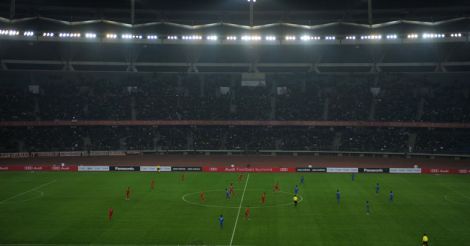It may be like comparing ships with boats. Yet, as India hosts the Under-17 World Cup Football, memories of the Commonwealth Games 2010, which was conducted during the same month, seven years ago, have come back. More so because Delhi's Jawaharlal Nehru Stadium is the common venue for both the events.
The games were huge as they saw the participation of 6,018 sportsmen from 71 countries and dependencies. While the football event has 504 players from 24 countries participating in a single sport, the games saw athletes competing in 272 events within 21 different sports genres.
The overall expenditure for organizing the games in Delhi (with the water sports being held in Chandigarh) was a staggering Rs 70,000 crores. Meanwhile, the football carnival has seen an expense of around Rs 2,000 crores in six cities.
Interestingly, although the two politicians who headed the organizing committees of both the events were from Maharashtra, they differed in their style and approach.
Suresh Kalmadi, the all-powerful president of the Indian Olympic Association, who was the chairman of the Commonwealth Games’ Organizing Committee, pulled his rank as a senior Congress politician and threw his weight around when it came to the event’s conduct.
There were scandals and controversies, which dissipated only after the Manmohan Singh government took over the organization and produced a fantastic opening ceremony, which was inaugurated by president Pratibha Patil, along with Prince Charles of United Kingdom. Kalmadi, though a former pilot of the Indian Air Force, was an excitable and impulsive leader, who didn’t care for the canons of administration and financial regulations.
The football event was managed by another former union minister, Praful Patel, who remained cool at the post as he conveyed the FIFA's strict guidelines to central and state governments regarding how the venues had to be prepared.
While Patel had to handle only six state associations, Kalmadi had a more complex set of voters to manage. He had to please 21 sports federations in the country, apart from 30 state Olympic associations, apart from liaising with the central and Delhi governments.
While International Olympic Committee and the Commonwealth Games Federation, along with the international federations for 21 sports, oversaw the preparations and conduct of the games, FIFA held the low, middle, and high ground this year.
Delhi benefited enormously in terms of urban and sporting infrastructure from the Commonwealth Games, getting a new airport runway and terminal, an airport metro service, bigger and wider road corridors, nine vastly-improved stadiums and a massive residential complex, which had temporarily housed the athletes. The six stadiums, where the football matches are being held, have been spruced to FIFA standards, but no new infrastructure has come due to this October's global event.
Interestingly, criminal cases against Kalmadi and his fellow office bearers are still continuing in courts, and the sports ministry has not yet closed the accounts of the seven-year-old games. On the other hand, the football tournament has not seen even a single allegation. But both have one thing in common – ticket mismanagement. A large number of tickets for the Commonwealth Games were released to VVIPs and government departments, turning away genuine sports fans.
Seven years later, this avaricious ‘sarkari’ attitude has once again seen a large number of tickets being given to government departments, depriving true sports lovers of an opportunity to watch the game. For the same reason, even though the central government arm-twisted FIFA and AIFF to shift Indian matches from Mumbai to Delhi on the grounds that there were more fans in the capital, the football fanatics in the city have been left disappointed.

























 Jawaharlal Nehru Stadium in New Delhi
Jawaharlal Nehru Stadium in New Delhi